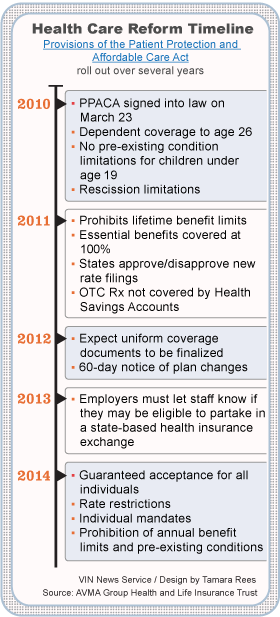
Medical coverage offered by an indemnity arm of the American Veterinary Medical Association (AVMA) could become a casualty of federal health care reform enacted in 2010.

Libby Wallace, chief executive officer of the AVMA’s Group Health and Life Insurance Trust, made that assertion last Friday during the association's annual House of Delegates gathering in Chicago. She announced that if language outlined in the Patient Protection and Affordable Care Act (PPACA) isn't clarified, the GHLIT could be forced to offer its brand of health insurance to the public, not just AVMA members, starting in 2014.
That would kill the program, Wallace proclaimed. New York Life Insurance Company, the GHLIT’s longtime underwriter, plans to drop the GHLIT if it becomes legally obligated to offer medical coverage to the general public, she said.
Right now, 17,000 AVMA members purchase medical coverage for themselves and their families through the GHLIT. The program, founded in 1957, is available to each of the AVMA’s 80,000-plus members.

Libby Wallace, CEO of the AVMA Group Health and Life Insurance Trust
It’s a “very valuable AVMA benefit,” Wallace said, noting that the GHLIT paid more than $118 million in claims during the last fiscal year. “Historically, for every dollar paid, 90 cents has been paid back in medical claims,” she said.
What’s to become of the GHLIT program hinges on how the U.S. Department of Health and Human Services (HHS) and other federal agencies charged with implementing and promulgating the PPACA’s statutory language treat “bona fide associations” — a classification defined in title XXVII of the Public Health Services Act that covers the GHLIT health insurance program.
Bona fide associations, a small group among health insurers, are comprised of association-built entities that organize their health insurance programs as opposed to acting as program participants merely marketing what's offered by an insurance company.
GHLIT holds a master insurance policy underwritten by New York Life Insurance Company, which enables AVMA members to purchase insurance under the group arrangement. Oversight of the plan is similar to a self-funded account; nine GHLIT trustees and one liaison from the AVMA supervise the program and have direct input in its design for veterinarians.
Right now, bona fide associations are not explicitly exempt from the PPACA rules that require plans to offer coverage to “all comers” by Jan. 1, 2014, when health insurance exchanges — state-regulated plans from which individuals may purchase coverage eligible for federal subsidies — are certified.
If regulators fail to recognized non-employer-based bona fide association plans, like the GHLIT plan, the program’s “unique advantages” will be eliminated, Wallace said.
Ambiguity in the current law also could mean that the GHLIT plan might be treated as individual policies, “subject to onerous administrative requirements” that could include having to seek the approval of various states before offering the program, said a GHLIT-issued newsletter on the topic.
“One of the fundamental tenants of the Patient Protection and Affordable Care Act oft-repeated by the architects of the legislation, including President Obama, was that if a person had health insurance that he or she liked, they would be able to keep it under the new health care reform law,” GHLIT officials stated in the newsletter. “Unfortunately, the extreme breadth of the bill and its great complexity, and the vagaries of the legislative process combined to create a situation where the treatment of some types of insurance plans … is far from clear.”
So is any guess as to whether the PPACA truly is a threat to GHLIT-issued medical coverage, considering health care reform itself is under attack. Two years after its passage, uncertainty about the viability of the PPACA dominates. Dozens of lawsuits have been filed since the act was signed, many objecting to its requirement that individuals must purchase health insurance or be fined, as well as other constitutional challenges.
On Nov. 14, the U.S. Supreme Court agreed to hear a challenge to the law's constitutionality in
Florida v. HHS Secretary Kathleen Sebelius. A decision is expected this summer.